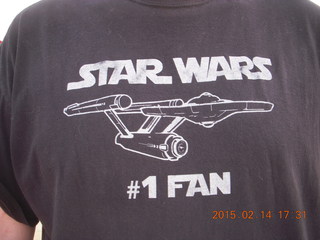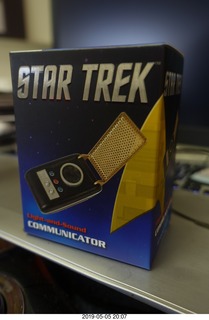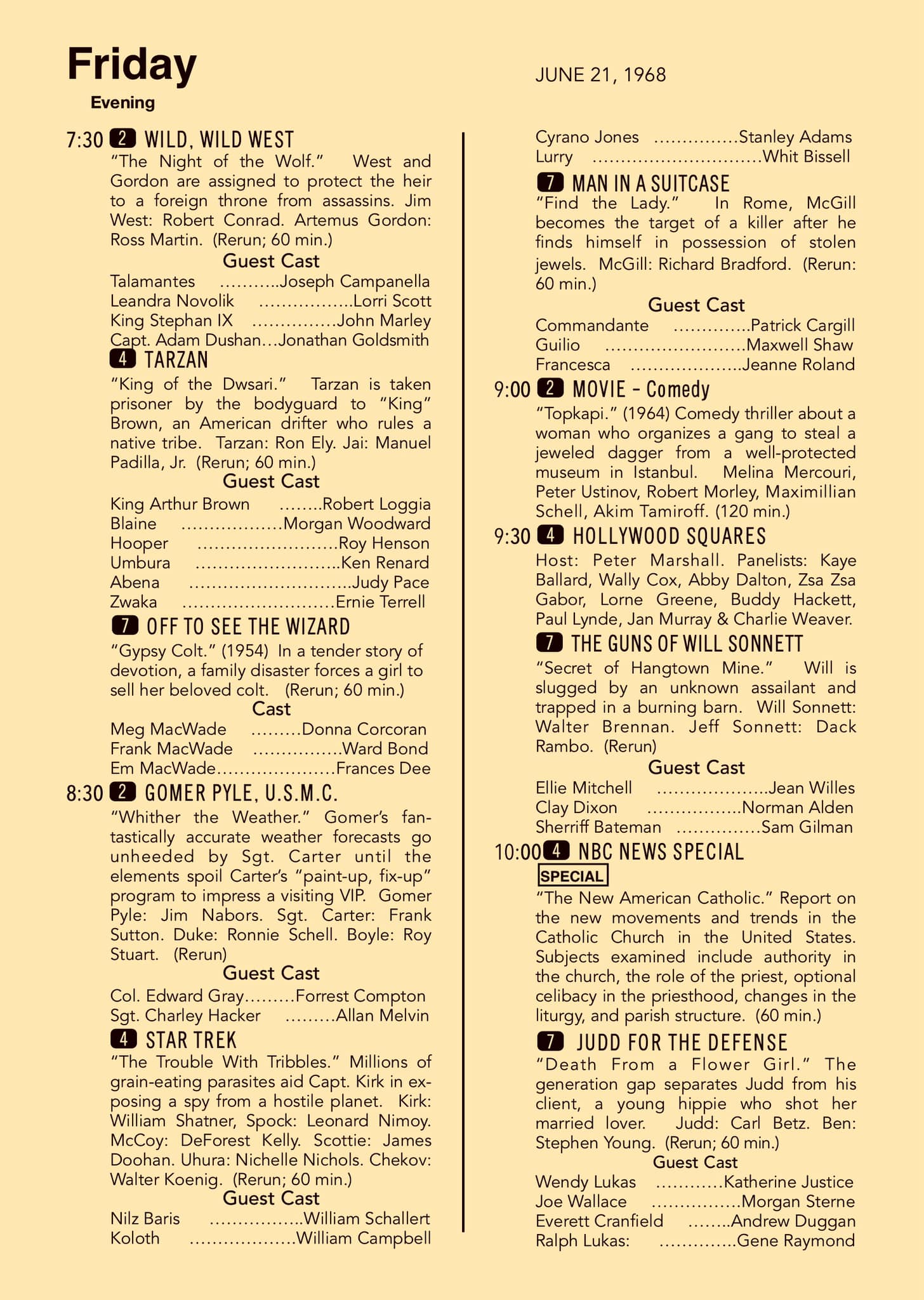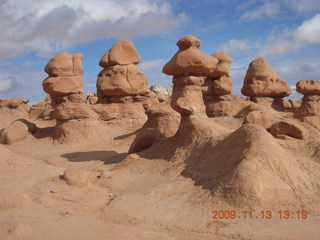
|
Star Trek Fifty-five Years Later2021 August 13 |

|

|
Star Trek Fifty-five Years Later2021 August 13 |

|
I got on the Star Trek bandwagon when a friend suggested I watch the second half of "The Menagerie." That would have been 1966 November 24, just about fifty-five years ago. We had a black-and-white television set.
I'm not sure what it was about the show that brought it closer to my heart than Lost in Space or The Time Tunnel or The Invaders or The Outer Limits or even The Twilight Zone, all good shows, but something special was there in this show. The interplay among characters like Kirk, Spock, McCoy, Uhura, Scotty, Sulu, Checkov, and Chapel was something special along with the roles of their offices on the bridge, in Sick Bay, in Engineering, et cetera. The international flavor of the crew came across as a natural consequence of being there rather than forced tokenism. The crew worked together as a space team amid personality foibles and squabbles.
As I watched the show over the years, I took no offense at its flaws. A friend described shows like Star Trek as "camp" where the flaws fit together. Everybody speaks English all over the galaxy. The transporter breaks all the time, but it almost never kills anybody. Things break a lot, but the ship somehow stays together. The United Federation of Planets is hundreds of "humanoid" life forms, but the crew of the Enterprise is almost all Earth-human.
The Earth-centric view of the show I accepted because the audience of the show was entirely Earthbound. It was clear the view of the Star-Trek universe was expanding and changing, especially during the first season. It was the "United Spaceship Enterprise" and then, later, became the "United Starship Enterprise." Somehow I got the impression that Earth was one of many planets in the Federation, not special in any way, but there were continuous references to Earth and Earth history seems central to the Enterprise culture.
The story that I came away with from the television show is that the diverse human crew came from many places, most of them had never been on Earth itself, but they kept their Earth-nation heritages. Checkov was Russian, Scotty was Scottish, Uhura was Swahili, and Riley was Irish, so Spock being Vulcan (or "Vulcanian" as they said sometimes) fit right in. As I watch the show again, I notice the Earth references are more pointed, but I see little evidence that the Enterprise crew members were from Earth any more than most of the so-called Irish people on our planet today lived in Ireland, or even visited there. As I recall, the Earth scenes on the show are from the Twentieth-Century, not the Twenty-Third.
The laws of physics are suspect, good television if not good science. In one battle the Enterprise is hit and shows on screen as tilting to one side as a damaged ship on the water when, in fact, there is no up or down in space. Time travel, accelerated Scalosians, and gravity waves make interesting plots for a young, eager, space-scifi-happy audience. For example, when Gary Seven is working on the nuclear bomb in what looks like a Saturn V rocket there is the sound of geiger-counter clicking. (Viewers from my generation get a seriously-heightened sense of urgency and fear hearing that sound. There is even a fake-geiger-counter iPhone application that clicks faster with higher readings when a thumb is placed on the lower-left part of the screen.)
Alien planets clearly have severe shortages of fabric evidenced by the sparse outfits worn by their beautiful women. I visited a Star Trek exhibit at the Smithsonian and noted how revealing those outfits were, a sneaky way past television censorship in those days.
The bad guys were bad without explanation. Just as the Japanese and American Indians were generic bad guys in John Wayne movies, Klingons and Romulans were warlike races who hated us and that was the end of it.
Captain James T. Kirk may have worked for galactic peace, but he was an able warrior when he needed to be. The Enterprise was armed with phasers and photon torpedos and the crew knew how to use them in battle. Captain Kirk also knew his way around women, lots of them, Earth-based human and alien, all good looking. We're never sure he had sex with them, but it sure seems that way on the show.
Finally, there was the "Prime Directive" not to interfere with another culture's development. Somehow they found a way to rationalize violating it just about every time they met another culture, also part of the Star-Trek mystique. It's also funny that other planets followed Earth's history not just in generality but so specifically that one planet mixed ancient Rome and modern television. (The Chicago gangsters and Nazi Germany were brought by Federation visitors violating the Prime Directive.)
The technology was funny. They could travel at warp speeds, sensors could identify two humanoids on a planet, but they still relied on human ears recognizing a voice as identification and the timers were rolling digits like my twentieth-century-automobile odometer. I understand the transporter was invented so the show producers wouldn't have to spend the time and effort to do ship landings with people disembarking and boarding.
I loved the show then and I love it today.
As I see the flaws and foibles, the incomplete portrayals of settings and cultures, I choose to embrace Star Trek as a television show painting with a broad brush. It's fun to watch with personal tension and intriguing settings and technology. "Warp five" and "beam me up" and "phasers on stun" have become part of our culture.
There are sequels and spin-offs. I explain it, "The Next Generation kept the ship, Deep Space Nine kept Star Fleet, and Baywatch kept the outfits." I have come to appreciate and to admire The Next Generation (TNG) after dragging myself through the first two seasons. I feel the second, fourth, and sixth movies do a wonderful job of keeping Star Trek alive while I found all the subsequent movies, TNG and "reboot," disappointing.
Star Trek Continues was an effort to recreate the original television show without adding anything, not a sequel, not a full-length motion picture, just more episodes of the show. I feel they did a wonderful job. My only complaint, which I make vigorously, is they only made eleven new episodes when I was hoping for at least another eighty to match the original. Star Trek Continues kept the spirit of the show, including its flaws and foibles, not a sequel, not a spinoff, but more of the original.
There is a so-called "remastering" of the original show. I keep copies of both original and remastered Star Trek. I find the remastered visual effects more satisfying, no insult to the original versions where they did so well with what they had in 1966. In my opinion after watching them once, whoever remastered it took nothing from the original spirit and spunk of the show. What looked good on a twenty-one-inch black-and-white television set, and maybe on a nineteen-inch color set a decade later, isn't as good as today's computer-generating images (CGI) on a larger screen with higher resolution. (They took away Sulu's rolling-odometer chronometer and replaced it with digital digits, probably the right thing to do, but, alas, I felt a certain sadness seeing that change.)
 I resist appending "the Original Series" (TOS)
to the name of the show.
There are sequels and spin-offs with their own names.
(As another example,
I have a pair of 1957-vintage
Quad ElectroStatic Loudspeakers (ESLs)
in my living room.
There was a newer Quad loudspeaker called ESL-63
for 1963, the year it was
supposed
to come on the market.
I don't call mine ESL-57 like some do, just ESL.
The first Star-Wars movie was Star Wars
which was later subtitled "A New Hope,"
but I still call it Star Wars
just like it was in the theater in 1977.
Similarly, I prefer to call the original show
Star Trek just as it appeared
in the newspaper TV page in 1966.)
I resist appending "the Original Series" (TOS)
to the name of the show.
There are sequels and spin-offs with their own names.
(As another example,
I have a pair of 1957-vintage
Quad ElectroStatic Loudspeakers (ESLs)
in my living room.
There was a newer Quad loudspeaker called ESL-63
for 1963, the year it was
supposed
to come on the market.
I don't call mine ESL-57 like some do, just ESL.
The first Star-Wars movie was Star Wars
which was later subtitled "A New Hope,"
but I still call it Star Wars
just like it was in the theater in 1977.
Similarly, I prefer to call the original show
Star Trek just as it appeared
in the newspaper TV page in 1966.)
My favorite episodes are "City on the Edge of Forever," "Amok Time," and "The Trouble with Tribbles," in that order and my least-favorite episodes are "The Lights of Zatar" and "The Omega Glory." While those choices are obvious to me, other Trekkies make quite-different choices of their favorites, which speaks for the richness and depth of the show.
In summary, the show was what it was, it is what it is,
and I don't want to change it.
The remaster was totally respectful of whatever it was and is,
but I resist any attempt to change anything else.
The James Blish books and Star Trek Continues
both respected Star Trek for what it was and is.
I'm proud to be a Trekkie for fifty-five years.
This is my super-brief history,
not much on details,
but my general idea of what started and ended
Star Trek
and what would create a spirit strong
fifty-five years later.
In 1966 Gene Roddenberry and some friends had a vision.
They made a pilot "The Cage" which didn't get far.
I'm told CBS said they already had a space-science-fiction show
with Lost in Space.
Lucille Ball and Desi Arnez took an interest in the show,
they formed DesiLu, and a there was a second pilot
"Where No Man Has Gone Before"
which was accepted and the show became a reality.
Not to waste the effort making the first pilot,
"The Menagerie" was a two-part Star Trek
story where the Star Trek characters
spend half their time watching Star Trek.
I love how they made the same ending so different
in "The Cage" and "The Menagerie."
So what ended the "five-year mission" after only three seasons?
In those days television shows were broadcast once and that's it.
If the show was Thursday from 8:00 to 9:00 pm
then one had to be in front of a TV Thursday evening to watch it.
I understand the show was set for
Monday 7:00 to 8:00 pm,
the prime time of prime time when,
at the last minute,
Rowan and Martin's Laugh In
got Monday evening 7:30 to 8:30 pm
and nothing was available except for Friday night
10:00 to 11:00 pm.
Who watched Star Trek?
Teenage males were
the primary age group for Star Trek
and how many young men are going to be home and awake
Friday night at ten o'clock?
Not many, sad to say,
and the writers and producers creating and funding the show
got the message.
What was left was a lesser third season
that didn't have enough viewers or momentum
for a fourth season and the show went off the air
only to continue in reruns.
Worse yet,
the fifty-two-minute episodes were cut to fit in
shorter time slots with more commercial advertisements.
(Shows these days are only forty-two minutes
meaning one-fifth of what we saw in the original broadcasts
didn't appear in the rerun-syndication episodes.)
There were full-length
movies
several
sequel
television shows,
a terrific
spoof,
so-called "reboot"
movies,
and a recent, online version where the original show
continues,
I have a personal connection with the show.
My mother grew up in Montréal
and went to high school with Bill Shatner.
After she graduated from McGill University
and moved to the United States for her graduate studies,
my grandmother remained friends with Ann Shatner
who was appropriately proud of her TV-star son.
(Alas, when I met William Shatner at a meet-and-greet
he remembered neither my mother nor my grandmother.)
In 1977 a blockbuster movie Star Wars
appeared with long lines for a month.
(I waited for the lines to go away
and then went to see the movie,
which was terrific.
The only movie I waited in line to see
when it first came out was "2001: A Space Odyssey.")
Star Wars became a huge phenomenon
threatening to obliterate all other space movies and television shows,
but Star Trek and Star Wars
have managed delightfully to coexist
as part of our entertainment culture.
I see them as
complementary
rather than competing with each other.
Star Trek was what it was and is what it is.
It shares the cultural stage with Star Wars
and 2001 and the Alien movies just fine.
After a decade, Hollywood came out with
a full-length motion picture called
Star Trek The Motion Picture.
It was bigger with a bigger plot and bigger graphics.
The six movies continued and refined the
Star Trek story.
With the same Federation characters
we are introduced to an Earth-centric Star Fleet
with the Golden Gate Bridge as backdrop.
(Do we really expect that beautiful bridge
to survive two or three centuries of San Andreas
earthquakes?)
We learn that James Tiberius Kirk is from Iowa.
We are introduced to some of the Klingon lore
including their language and, somehow,
their cloaking device that we thought was only Romulan.
The seeds of Federation-Klingon cooperation are clearly sown.
Two of the four movies are about a large, scary alien force
coming directly to Earth to destroy it.
Kirk has an apartment in San Francisco.
There is a shift from Earth history to Earth-centric plots.
My own judgment is that the even-numbered movies
are all better than the odd-numbered movies.
I found "The Wrath of Khan" my favorite,
maybe the best Star Trek ever
and the first movie lacked the spirit and life
found in the television show or the other five movies.
There are some minor plot inconsistencies in the movies
just as there were in the television show.
Just as with the television show
the inconsistencies don't spoil the fun of watching the movies.
There appeared a new show, The Next Generation.
The first few episodes I saw were disappointing.
I found myself resenting the "Star Trek" prefix
on the show's title.
There was an episode where the whole story
was an amorphous creature captured and killed a crew member
and her memorial service.
The original show would have had
an space battle, a clash of personalities,
and some kind of system malfunction.
Another episode had a planet wiped out by a crystaline entity
that was familiar and yet had almost never been seen before.
The android Data's attempts to be human seemed a poor
re-creation of the original Spock.
A truly lovely episode "The Inner Light"
was terrific television, but had virtually nothing
Star Trek in it.
One younger friend said the new show was terrific
and he preferred it to the original.
The Latin "Non gustibus non est disputandum"
means "There is no disputing taste,"
but my what I saw was clearly inferior to
the real Star Trek.
Then a friend closer to my own age said,
"Adam, the show is really good,
but you have to endure the first two mediocre seasons
to get to the five really good ones."
He didn't try to say it was better,
I don't think he thought it was better,
but he said it was definitely worth the investment in watching it.
So I watched all seven seasons.
The first two seasons were frustratingly awful.
Human hostages are taken by grabbing them in a transporter beam,
Data's attempts at humanity are annoying and embarrassing to watch,
the holodeck and its failures are major plot elements,
a mind-reading counselor makes negotiation episodes boring,
and their concept of the Prime Directive was completely mixed up.
The show is introduced with the tedious, annoying character Q
who starts the first episode with a trial of humanity in the show
when we have yet to get any idea of who that humanity might be.
I also found Counselor Deanna Troi's mother Lwaxana
is also especially annoying.
There are several examples of annoyingly-bad perspective.
In its third season The Next Generation unfolds.
Data is no longer a Spock substitute but has his own mind and voice
and the other characters grow and develop well.
The Klingon officer Worf is a wonderful character on the show.
Captain Jean Luc Picard is himself
a fascinating character with extraordinary insight and judgment.
One example has Picard confining a rogue Federation officer
for attacking the Cardassians.
Picard knows the officer's suspicions are correct
and warns the Cardassian ambassador that he knows they're correct
as the two part ways.
Appropriate for a sequel,
things left to the viewer's imagination in the original show
are developed more fully.
Through Worf we see our now-allied Klingons in far more detail
with their warrior heritage contributing to their strong character.
Towards the end of the seven-season run it becomes clear
that the Romulans will become friends as well.
There are lovely, sweet emotional touches throughout the series.
The Ten-Forward bartender Guinan played by Whoopi Goldberg
is an intriguing and sensitive character.
While the crew is much more galactically-cosmopolitan
with all kinds of humanoids in the crew,
the Earth-centric attitude of the Star-Trek movies expands.
Picard is from France and Riker is from Alaska,
not just by heritage but by actual, physical upbringing.
When the Borg attack the Federation
with overwhelmingly-superior force,
they head straight past Mars and the Moon
for the blue planet I call my home.
I'm disappointed by Picard's lack of warrior ability.
He seems unable to defeat anything more than an unarmed freighter.
The one time Picard's Enterprise is nose to nose
with a Romulan warship
the Romulans retreat because a large Klingon Bird of Prey
decloaks behind the Enterprise,
a mama bear appearing over the hill to defend her puny cub.
The only major victory is over the Borg
by infecting their collective mindset with a dose of individuality.
The Enterprise is nearly conquered
by dirt from a planet and Welsey's high-school science experiment.
The fragility of the Enterprise also frustrates me.
It seems most episodes have imminent warp-core breach,
failure of life support,
communications failure,
and inability of the computer to do anything about it.
At the end of three seasons of Star Trek
I would eagerly watch a fourth and fifth
(as I watched the movies
and Star Trek Continues)
and
at the end of seven seasons of The Next Generation
I would eagerly watch an eighth and ninth.
The Next-Generation movies seem to have
everything blowing up with the main characters
facing one outrageously-narrow escape after another
until Data blows himself up to save the universe
at the end of the last movie Nemesis,
kind of like Spock's death in
The Wrath of Khan.
Without claiming any superiority
of Star Trek or The Next Generation
I'll suggest that those who enjoyed the former
should plow through the first two seasons of the latter
to enjoy five seasons of a worthy sequel
to the original television show.
Without ever mentioning Star Trek
or any characters in Star Trek
the movie brings much of the joy of the original show
and adds its own delightful humor.
Yes, I highly recommend it.
There is a sequence on a planet's surface
filmed at Goblin Valley State Park in Utah,
an intriguing and incredibly-beautiful place.
I have a full, longer
piece
on why I didn't like the so-called "reboot" movies.
The short version is it seemed a desperate attempt
in the Quest for More Money out of the Star Trek name.
I was especially "bummed" at how shallow these two movies were.
It seems somebody who never saw Star Trek
got two or three sentences about each
main character in the show and wrote a script
with no real understanding.
It would have been wonderful to have a real prequel
about the different places and times these individuals came from
and how they came together on the Enterprise.
Oh, well.
From my own web page on the reboot movies:
I remember Bill Cosby,
in one of his early "childhood" routines,
talking about the best monster film ever.
It had the mummy, Frankenstein, the wolfman,
"everybody was in it."
The frightened children in Cosby's monologue
hid under the seats so long
"our backs were covered with black Jujyfruits"
(or something like that).
What a wonderful way to portray the mind of a child
going to scary movies in the theater!
In fact,
each of these monsters has his own lore and mythology
separated by centuries and continents,
so they would never meet each other
in real life.
Only the monster-fan child would think a movie with all three
(and maybe a few more, like Dracula)
was a good movie.
As an
adult
movie viewer,
I expect more dramatic unity from my movie experiences,
some allegiance to the original mythology.
I don't know what possessed Vic Mignogna
and his friends to recreate the original show.
As I understand, these folks built their own sets,
wrote their own episodes to continue the original show,
and, with a wink and a nod,
got Paramount to look the other way
(not quite permission, but forgiveness is good enough).
I'm sure I wasn't the only Trekkie to send them money.
The episodes generally took off from the original show
including a return of Apollo,
Kirk's old girlfriends coming back to haunt him,
and even a continuation of the parallel universe
where the Federation is an evil empire.
All the episodes are available
online
and they are a joy to watch.
It takes a few minutes to get used to difference faces
playing the same old characters with all their spunk and sizzle.
My only lament is they stopped after just eleven episodes.
After building all those sets and getting such a good cast,
not to mention accumulating a community of fans,
it would have been great if they had continued their continuation
for another eighty episodes.
 Just before the turn of the Twenty-First century
a wonderful movie came out,
the Star Trek equivalent
of the Star Wars spoof Spaceballs.
It was called GalaxyQuest
with Tim Allen as Shatner and Kirk,
Alan Rickman as Nimoy and Spock, and
Sigourney Weaver as Nichols and Uhura,
but with different names.
The actors on a long-gone television show GalaxyQuest
find themselves taken by aliens called Thermians who saw the show
to defend them against their own enemy Sarris.
Seeing the small, toy model ship on the show,
the Thermians build a full-size, full-power version
of the NSEA Protector.
Just before the turn of the Twenty-First century
a wonderful movie came out,
the Star Trek equivalent
of the Star Wars spoof Spaceballs.
It was called GalaxyQuest
with Tim Allen as Shatner and Kirk,
Alan Rickman as Nimoy and Spock, and
Sigourney Weaver as Nichols and Uhura,
but with different names.
The actors on a long-gone television show GalaxyQuest
find themselves taken by aliens called Thermians who saw the show
to defend them against their own enemy Sarris.
Seeing the small, toy model ship on the show,
the Thermians build a full-size, full-power version
of the NSEA Protector.
|
11:43:48 Mountain Standard Time (MST). 484 visits to this web page. |